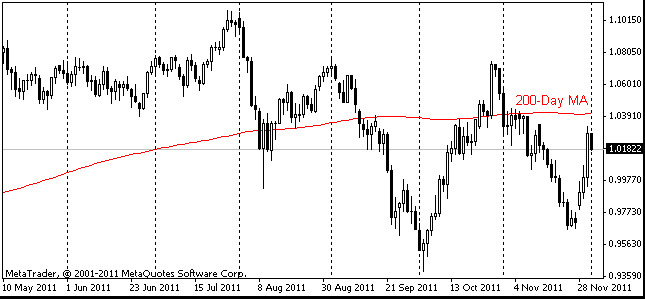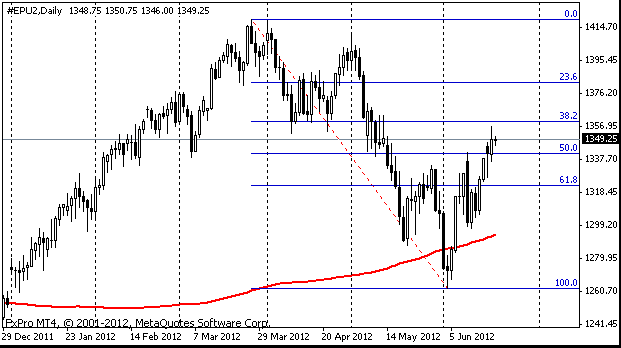EUR/usd
Those, who ventured to stake on risk yesterday morning, must have been generously rewarded in the evening. Though at the end of Monday's trading the single currency sank to 1.2550, already yesterday evening it found enough strength to test the 1.27 level. Today's quotes remain close to this mark. The Fed's meeting is ahead. In the last few days it has been widely rumoured that the fomc will react to the weak market data with another round of Operation Twist. The major advantage of such steps over the additional purchases consists in the absence of any inflationary aftereffects. The fact that the market more expects Twist than Q3 is seen in the reaction of gold and oil. These commodities usually face a strong rally on the expectations of higher inflation, however this time it's more likely that their growth simply reflects depreciation of the dollar. Meanwhile, the stock exchanges on the contrary look much more cheerful, as the reduction of long-term interest rates (the consequences of Operation Twist) makes investing in the stocks more attractive and promising. The euro still meets certain obstacles on its way and the periphery bond yield remains high. Nevertheless, yesterday we saw some signs of progress. From the FT we learn that Monti is advancing the plan of periphery debt buyback by means of EFSF. Yesterday we also heard messages that the Spanish banking sector can get up to 125bln, as Germany is likely to take a less tough stance. In these circumstances it becomes clear why most central bankers have been abstaining from any significant activity over the last two weeks. The Fed can also follow the same scenario. In other words, we shouldn't regard Twist as a settled thing. If today's meeting proves to be disappointing, we may expect the short-term surge of interest in the dollar, however the overall improvement can finally prevail. No matter what results we will see today, we suppose that at the end of the week the euro will be above the current 1.27.

GBP/USD
If earlier inflation in Britain proved to be higher than forecasted, now it systematically comes below the overall expectations. The CPI data published yesterday indicated a 0.1% drop instead of the expected 0.1% growth. The annual inflation rate slowed down from 3.0% in April to 2.8% in May. So now the Bank of England can breathe a sigh of relief and King doesn't need to explain to the Treasury why the inflation exceeds the target level by more than a percentage point. Yet, against our expectations the sterling didn't fell sharply yesterday due to the general rally of risky assets across the market. As a result, yesterday the sterling went above the Monday high of 1.5740 and reached 1.5760. This morning the rates hold above 1.57. As long as the markets grow, the pound will remain in demand.

AUD/USD
The Australian dollar continues its victorious march upwards as if it had completely forgotten all the factors that were pushing it down earlier. It's of interest that commentators see the reason for it not only in the external data, but also in the excellent GDP growth in 1Q and quite strong labour market figures reported a couple of weeks ago. With all our confidence in the strength of the Australian economy we still recommend you to keep sight of the trade deficit expansion, which has been observed in the last few months. Very soon it will most likely spill over into the economic downturn. The leading indicator published today also forecasts a sharp slowdown in the coming months. According to it in the coming 3-9 months the annual rate of economic growth will fall down to just 0.2% as opposed to the average long-term figure of 2.6% and the previous figures around 2.2%.

From the peak reported on March 27 S&P 500 sank by more than 10% over April and May. However, half of the losses have been recouped this month. Probably, the stock bulls should take a break. This run of events is quite possible if Bernanke doesn't prove to be mild enough. However, it's more than likely that the stock exchanges still have the potential for further growth as investors are actively searching for more lucrative assets after the yield of liquid government bonds dropped in May.
